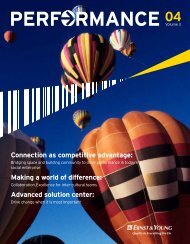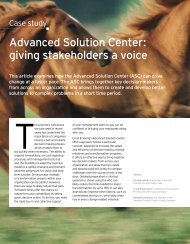The case for a chief operating officer - Ernst & Young
The case for a chief operating officer - Ernst & Young
The case for a chief operating officer - Ernst & Young
You also want an ePaper? Increase the reach of your titles
YUMPU automatically turns print PDFs into web optimized ePapers that Google loves.
Case study<br />
“It is up to us COOs<br />
to prove that we’re<br />
bringing added value,<br />
or we would be bringing<br />
more value, than if our<br />
function was dispersed<br />
across the organization.”<br />
Daniel Bandle<br />
COO of Axa Winterthur<br />
many examples of this, Apple’s appointment<br />
of prior COO Tim Cook is merely the most<br />
high profile.<br />
For COOs, this is part of the appeal.<br />
<strong>The</strong> majority of these executives are<br />
highly ambitious — and rightly so, given<br />
their diverse and strong mix of skills and<br />
experience. In a survey of over 300 COOs,<br />
<strong>Ernst</strong> & <strong>Young</strong> found that 40% noted a<br />
personal aspiration to step up to the top job,<br />
a higher proportion than the 30% who felt<br />
that their current role was a suitable final<br />
career destination.<br />
But this clear aspiration also highlights a<br />
political challenge that needs to be carefully<br />
managed internally: the balancing act<br />
between CEO and COO. It demands that<br />
the two roles act as complementary <strong>for</strong>ces,<br />
rather than destructive rivals.<br />
This extends through to personality too:<br />
two abrasive, hard-charging executives<br />
may well find it more difficult to cooperate<br />
effectively, <strong>for</strong> example. “If you’re an<br />
introvert CEO, then you’re probably<br />
very happy to have a COO who will go<br />
to stakeholder meetings and engage<br />
the employees,” says Markus Heinen,<br />
Per<strong>for</strong>mance Improvement Advisory Leader<br />
<strong>for</strong> Germany, Switzerland and Austria at<br />
<strong>Ernst</strong> & <strong>Young</strong>. “But if you’re an extrovert<br />
CEO, then the last thing you need is a COO<br />
mirroring your own character. You need the<br />
right combination of behaviors and expertise.”<br />
But despite the obvious opportunities<br />
<strong>for</strong> such a role, and the varied benefits it<br />
can deliver, it is also clear that COOs need<br />
to do more to sell themselves to the rest of<br />
the business. “I think that, in order not to<br />
become redundant, we have to prove that<br />
it really does make sense to bring these<br />
operational functions together [into a single<br />
role],” argues Bandle. “It is up to us COOs<br />
to prove that we’re bringing added value,<br />
or we would be bringing more value, than<br />
if our function would be dispersed across<br />
the organization.”<br />
Making the <strong>case</strong><br />
This challenge is a pertinent one.<br />
<strong>Ernst</strong> & <strong>Young</strong>’s research shows that, while<br />
about half of C-suite executives strongly<br />
agree on the merits of the COO function,<br />
the balance is only somewhat convinced,<br />
or else disagree outright. “We need to<br />
do a better job of marketing ourselves,”<br />
says Bandle.<br />
<strong>The</strong> most obvious difficulty in doing<br />
so lies in finding a way to rise above the<br />
intense day-to-day operational demands,<br />
in order to gain a more strategic sense of<br />
the business. “You’re expected to be a fixer<br />
and are responsible <strong>for</strong> all the operational<br />
problems that happen. In a global<br />
business, this means that the COO can<br />
feel like he or she is on call 24/7,” explains<br />
Vivienne Ouyang, COO of CHIC Group, a<br />
Chinese conglomerate.<br />
Encouragingly, though, there are many<br />
potential opportunities to demonstrate<br />
their value. By its very nature, COOs get to<br />
straddle a host of other functions, giving<br />
them a unique perspective with which to<br />
identify inefficiencies, functional overlap or<br />
new opportunities and then explore ways<br />
to start overcoming these. “By weeding out<br />
inefficiencies, and deriving economies of<br />
scale across operations, we can add much<br />
more value than if our role was scattered<br />
across the organization,” says Bandle.<br />
Denis Chuiko, COO of Russian Post, the<br />
state postal operator, agrees: “My duty<br />
is to create a well-oiled machine that will<br />
guarantee that targets can be accomplished<br />
within the framework of the strategy,” he<br />
says. This is not just true across different<br />
functional silos, but also within regional<br />
ones too. A central perspective on this can<br />
make it easier to see where activities should<br />
be best located and whether they are better<br />
served in-house or outsourced.<br />
Furthermore, by typically being more<br />
intimately acquainted with actual customer<br />
needs, they are well placed to help<br />
ensure that back-office changes do not<br />
fundamentally affect the competitiveness<br />
of the company, but rather contribute to<br />
its per<strong>for</strong>mance and profitability. At AXA<br />
Winterthur, Bandle regularly visits its call<br />
centers to talk with customers on the<br />
phone, or visit claim sites: “Last week, I<br />
accompanied a claims inspector looking at<br />
water damages in a region. You need that<br />
combination of being very close to the real<br />
operations, but also keeping in mind the<br />
bigger picture of the strategy and wider<br />
environment,” he says.<br />
Defend or grow<br />
From a macro perspective, COOs have<br />
the ability to make a positive contribution<br />
toward improved overall per<strong>for</strong>mance in<br />
three broad areas. First, and most obviously,<br />
on execution: keeping control of daily<br />
20 Volume 5 │ Issue 1






